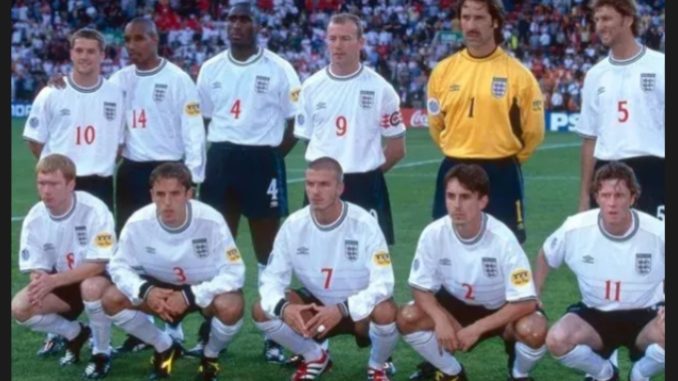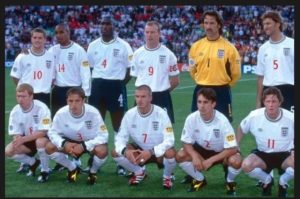
My biggest regret was choosing Manchester United over England – Paul Scholes

Paul Scholes played 66 times for the Three Lions over a seven-year period but the Man Utd legend curtailed his international days.
Playing for one’s country is usually described as the pinnacle for any professional footballer.
Even in 2024, when club versus country wrangles are rife and players’ workloads are being pushed to their limits, there’s still space for the magic of major international tournaments.
Nothing comes close to sealing World Cup or European Championship glory. Just think back to the national outpouring of ecstasy when, for example, Luke Shaw opened the scoring for England in the final of Euro 2020. Shaw may go on to scale the heights of club football with Manchester United – but that moment with the Three Lions will follow him everywhere for all the best reasons.
It wasn’t quite the same for Paul Scholes. One of the most decorated club players of all time, never mind his generation, the former United midfielder felt so disillusioned while playing for England that he left it behind at the age of just 29.
The question he always got asked – and still asks himself – is why?
Former United player Michael Clegg revealed in his book The Power and the Glory just how much Scholes disliked England duty around the time of his early retirement in 2004.
“[Paul] said he hated playing for England, which came as a bit of a shock,” said Clegg.
“I asked him why he kept turning up and he said ‘Well it’s England, that’s what you have to do’. Paul was worried about the reaction he would get from the rest of the country if he stopped playing for England.
“I asked him if he’d ever felt the same way playing for his school team or with his mates or for United – and he said that was different. He loved that. I told him that he was being bullied into doing something that went against his own instincts.
“Not long afterwards, he packed in international football. Was it down to our chat? I don’t know because we never spoke about it again.”
Paul Scholes
Paul Scholes
Scholes had just started all four matches for England at Euro 2004, a tournament the Three Lions really ought to have challenged to win, yet ended up exiting at the quarter-final stage – as they’d done at the 2002 World Cup. It was a stellar international side that harboured hopes of going one or two steps better in 2006.
For Scholes, however, who enjoyed his own privacy and downtime with family and friends, the extra summers travelling with England were becoming a burden.
“I know he didn’t like being away from home,” added Clegg. “He was always a family man and he didn’t want to be away from his wife and kids. If you go away with England and you’re not happy then you’re not going to perform at your best on the pitch.”
That’s not to say Scholes didn’t have great moments playing for England. He’d already won 66 caps for his country by the time of his retirement, scoring an impressive 14 goals – many of them memorable. His statement on retiring said the decision hadn’t been taken lightly.
His four starts at Euro 2004 had all come on the left wing, the “graveyard shift” as some dubbed it, with the United man sacrificed out wide to accommodate Steven Gerrard and Frank Lampard in the middle in Sven-Goran Eriksson’s rigid 4-4-2.
(Image: Bongarts)
In his own autobiography, Scholes later dismissed the idea that doing the “graveyard shift” had contributed to his retirement. To him, it was a combination of factors.
“Playing on the left was never a problem,” he said. “I played on the left for United, I don’t know how many times. I probably had my most successful time scoring goals in that position so it was never a problem.
“I just got fed up. When you are going to a team, you want to be part of a team and play well, but there are individuals who are after personal glory. That is the biggest problem with English players – most of them are too selfish.”
Other options emerged in the England midfield, some of them offering greater balance alongside Gerrard and Lampard, such as the United duo of Michael Carrick and Owen Hargreaves, who could play deeper – a role Scholes wouldn’t adapt to until much later in his club career.
The irony is that curtailing his England days allowed the Oldham-born maestro to elongate his United career – and learn a new position dictating play from the base of midfield.
It was reported that Steve McClaren had twice asked Scholes to recommence his international career in 2006, but Scholes declined. Fabio Capello also asked the question in 2010 but again the answer was no.
It wasn’t until much later that the regrets started to kick in regarding his England days.
In 2020 Scholes said on that decision: “I do regret leaving England so soon. I went back to United and my football changed. I had been a player who was expected to score goals all the time for England, which I was judged on.
“Sir Alex Ferguson wanted me to play well into my 30s and saw I needed a different position. I moved back and controlled games from midfield, sitting deep, and I was never that player for England.
“I ended up playing there for five or six years and looking back playing there from 30-35 was probably the most enjoyable part of my career. I really enjoyed that position, I wasn’t scoring goals but to sit back and control games, I really enjoyed it. I finished with England too early to progress in that position.”
Perhaps Scholes could have been the ‘sitter’ behind Gerrard and Lampard and England’s so-called Golden Generation would have won a major prize. But it’s a tale of what might have been.
The debate over who was the better player and who enjoyed the better career between Scholes, Gerrard and Lampard is one that continues to rage to this day. Ever modest and humble, Scholes had since admitted that Gerrard did things he could never do.
“I wouldn’t be able to do what he did at Liverpool,” Scholes said, referencing Gerrard’s ability to drag a middling Liverpool side to FA Cup and Champions League trophies.
“Whether he could’ve done it at United, I don’t know. I don’t see why not. But I couldn’t have done what he did at Liverpool, no.”
For those who are passionate about the national team, it’s just a shame they couldn’t do it for long enough in England colours.
Leave a Reply